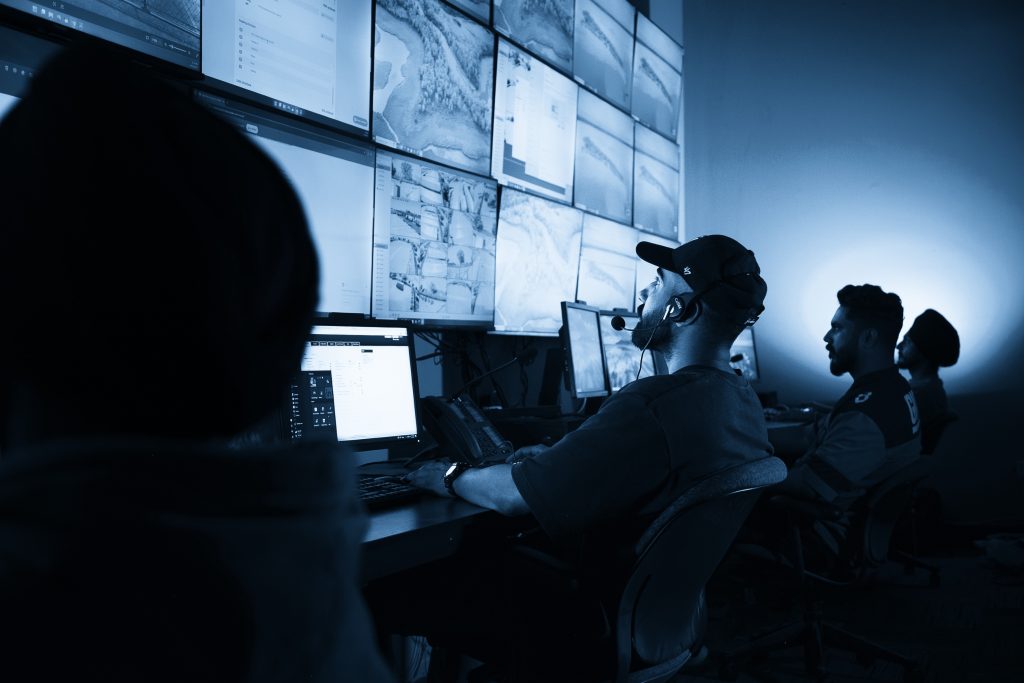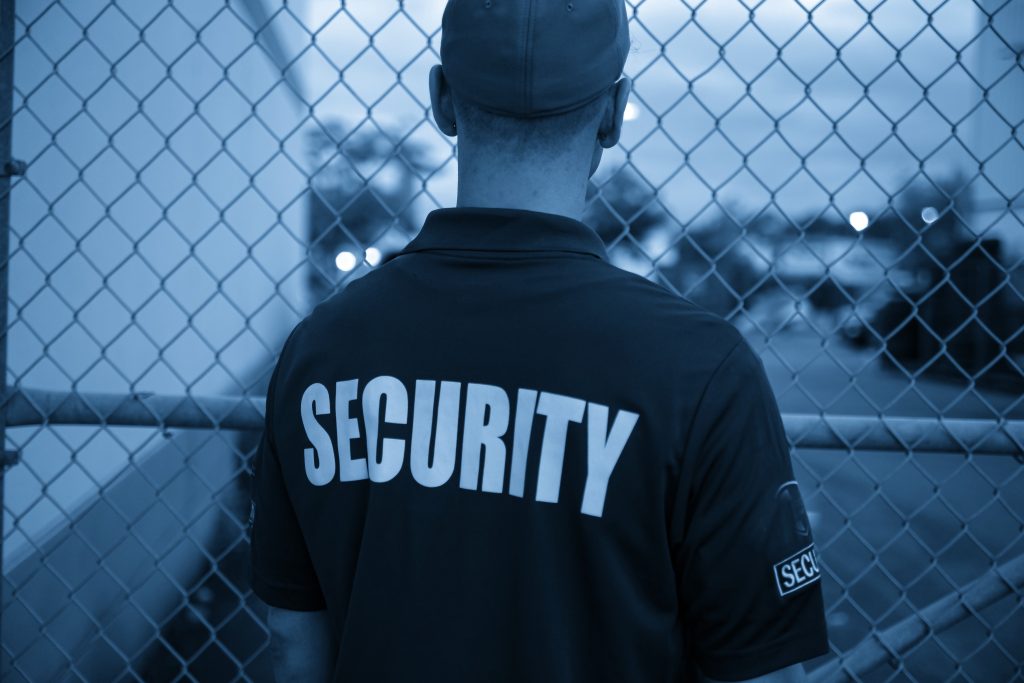Live video patrol
Video Patrol vs. Security Guards:
Which Offers Better Protection?
The most concerning question for business owners in securing their properties with outdoor assets is whether a video patrol system is a better investment than hiring traditional security guards. Both options, aim to protect your assets, reduce threats, and provide peace of mind, but they differ significantly in work mode, cost, and effectiveness.
Let us have a head-to-head comparison of video patrol systems and traditional security guards, focusing on their capabilities in security services, remote video monitoring, live monitoring, and yard reporting.
You will clearly understand which option provides superior yard protection by the end.

What is a Video Patrol System?
A video patrol uses video analytics, live agents, and sophisticated cameras to keep a property safe. These platforms are also being actively monitored by highly trained live agents who can respond rapidly to anything suspicious instead of passive monitoring.
Thanks to features like motion detection, night vision, thermal imaging and high-definition video, even the most challenging conditions are captured with ease. Remote video patrol allows live agents to monitor multiple cameras from a single monitoring centre, supported by live updates and detailed yard reporting.
What are Traditional Security Guards?
Traditional security guards are on-site staff members hired to respond to security situations, and patrol. They interact with visitors or trespassers, make rounds, and check locations. Guards can perform operations that require some level of human decision-making, and calming down angry customers, and they serve as a deterrent.
The guards’ effectiveness is contingent upon their physical presence, training, and watchfulness, which may be less effective in sparsely populated, large sites, or remote yards.

Comparing Video Patrol and Security Guards
Let’s break down the comparison across key factors.
- Coverage and Visibility
Video Patrol:
A video patrol system provides unmatched coverage. Eagle Vision Security will install specific cameras in strategically selected locations, and you can eliminate blind spots and live agents will monitor every part of your yard. Nothing escapes with PTZ Cameras that have zoom, and the ability to look 360 degrees. Night vision and Thermal Imaging Technology also ensure we can see what’s happening 24/7, even when the weather is bleak or the light is dim.
Remote video patrol systems offered by Eagle Vision Security can be expanded to cover several locations, making them perfect for large industrial yards, construction sites, or storage facilities.
Security Guards:
Guards are limited by their physical presence. Other areas are left exposed since a single guard can only monitor one area at a time. Large sites and Truck Yards need several guards to provide sufficient coverage, which raises expenses. Human fatigue, diversions, or the need for pauses can further diminish visibility.
Additionally, guards find it difficult to operate in low-visibility situations without specific equipment, which isn’t always available.
- Response Time and Incident Handling
Video Patrol:
At the heart of any video patrol system is Live Video Monitoring. Highly trained agents monitor streams in real-time to spot dangers as they arise. Live Agents can react quickly to an issue by setting off warnings over ultra loud horn speakers, calling law enforcement with level 1 priority, or sending out workers to the scene.
Remote video patrol systems are typically combined with intercoms or access control to enable operators to confront any attackers directly. With instant alerts and high-definition images, a quick response can be ensured to enable the authorities to act fast.
Security Guards:
Traditional guards can only respond to the event they witnessed or were notified of, but the time for them to react would vary. If something happens outside their patrol route, they may not see it immediately. The guards must physically reach the location, which can contribute to a delay in response time at large sites or Truck Yards.
However, guards can go as far as confronting intruders, which exposes them to personal danger, and what happens at this point will depend on their training and judgment. Also, communication could be slower than a centralised system with the authorities.

- Reliability and Consistency
Video Patrol:
Video Patrol systems operate continuously, day or night, without human error, diversions, or wear and tear. The constantly monitored cameras won’t stop, become sick, or lose concentration. Modern video analytics, such as motion detection and License Plate Recognition, ensure impeccable reliability by instantly notifying live agents of anomalies.
Recorded videos are an undeniable account of the occurrence and will therefore demand accountability. Remote video patrol live agents are trained to follow and enforce safety protocols, which guarantee their performance is consistent through shifts.
Security Guards:
Guards are human, and humans are prone to error. Fatigue, boredom, or lack of motivation reduces alertness during long shifts. Inconsistent training or high turnover leads to disparity in performance levels. Safety risks are also present with guards, which can hinder their performance. Without documentation like video footage, disputes over incidents become hard to prove.
- Yard Reporting and Documentation
Video Patrol:
Video patrol systems have an outstanding feature of Yard Reporting. Incident, patrol, and observation reports created by live agents that are detailed and frequently include timestamps and video evidence. Such reports are immensely useful in audits, insurance claims, or court cases. Clients are informed frequently about the yard activity, which adds transparency.
Automated analytics will produce Damage Reporting on trucks and trailers that are entering or exiting your facility.
Security Guards:
The guards provide basic reports based on their observations, which is not as simple as having a video. Handwritten logs or verbal accounts can never be complete or objective. In the absence of cameras, there is no visual backing to investigate claims, making them all the more difficult to make. Generating detailed reports also requires time, diverting guards from their patrol duties.
Traditional Security Guard Limitations
- Prone to human error
- Days off and leave of absence
- Higher training costs and ongoing costs
- Limited to see what is happening only where they are positioned
Which is Better for Yard Protection?
Video patrol systems such as the ones offered by Eagle Vision Security are the most effective way of securing large yards in most businesses. They provide wide coverage, quicker response time, are cost effective, and are consistent in their performance, and to support all this, they provide extensive yard reports.
Since remote video patrol and live monitoring identify and respond to threats in real time, the latter systems surpass on-site guards. Traditional guards are applicable in specific cases, but they are not easily scaled and cannot be trusted to cover large or remote yards.

Conclusion
Looking for the right security solution for your yard? Choose a smarter, more effective option with live video patrol systems—an advanced alternative to traditional guards.
Eagle Vision Security delivers high-tech, tailored monitoring solutions for all types of properties. With cutting-edge technology and 24/7 coverage, we protect every inch of your property. Don’t leave your assets exposed- Contact us and secure your property with Eagle Vision Security today
